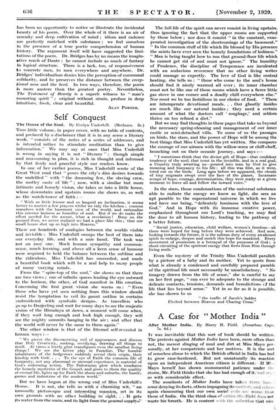A Case for Mother India "
IT was inevitable that this sort of book should be written. The protests against Mother India have been, more often than not, the merest slinging of mud and dirt at Miss Mayo per- sonally, at her compatriots and her motives. It is the- sort of senseless abuse to which 'the -British official in-India has had to ,grow casehardened. But not unnaturally its reaction upon an independent American citizen--is different: -If Mayo herself has shown monumental patience under the storm, ,Mr.-Field thinks that she has had-enough of it; hncl saIN. sO with considerable effect..
The assailants of Mother India have taken three "lines , some denying its facts, others impugning its motivets;and others again clamouring that our own social- evils .fire worse- those of India. On the third class of critics Mr:IFIeld dOes not waste-his-breath:- -He is content with-the rolieetkur that -vice
, _ . •
in Europe and Arrerba is not endorsed by public opinion, still less by religious sanction, which, as Bishop Whitehead pungently remarks, has made the efforts of Indian social reformers so ineffective. With the critics who have persuaded themselves that Miss Mayo was hi a Conspiracy with the British Government to prejudice the case for Indian political freedom, Mr.'Field deals in more detail. People like Mr. C. F. Andrews or Miss Wilkinson, M.P., might have been expected to be less credulous ; but the consistent attempts in India to represent Miss Mayo as an agent of a malign Government are typical of the depths into which the extremists have dragged political controversy.
Mr. Field keeps his heavy guns for those who have tried to controvert Miss Mayo's facts. Mr. Gandhi heads the list. He questioned the accuracy of Miss Mayo's account of her interview with him. Mr. Field produces the summary of the interview recorded on the spot, typed out immediately; edited and passed by Mr. Gandhi himself. Then come a group of American missionaries, with an unctuous disclaimer of their countrywoman's exaggerations and prejudice. Had they ventured no further than this they would have been safer ; but, descending to detail, their chief spokesman, Dr. Alden H. Clark, D.D., has comniitted himself to distortion of elementary facts and figures, which, for the credit of his cloth, we must hope was less than deliberate. Finally, we have persons like Mrs. Naidu assuring a San Francisco audience that child marriage is as rare in India as in America, or the Columbia student who denied that Untouchables existed in India, or Mr. Ranga Iyer when he tells us that prostitutes are kept in temples "to instil into them some religion, some fear of God." To this class of critics Mr. Field is amply justified in giving the lie direct.
It is quite possible that this stout defence of Mother India will be the signal for a fresh outburst of hysterical protest, Ng for Most of us it ends the controversy. To several charges in Miss Mayo's indictment—particularly her chapters on eritecblogy; the treatment of animals, and primary education —there has been no answer, because they are unanswerable. For the rest, Miss Mayo has suffered more from her friends than from her enemies. Her enemies have been grossly offensi-Ve Without being effective. Her friends, on the other hand, have had to point out that she has overlooked India's own efforts at reform, and that she often writes as if the evils she saw were universal. The Indian matron who escapes widowhood and polygamy. lives a useful and generally a con- tented life. It is on her, says "Al Carthill," that her husband leans " for domestic comfort, for the management of the house, for assistance [if a Hindu] in the due performance of the sacred rites" '; lie cherishes her - accordingly, and she enjoys a power in the family which is wholly disproportionate to her publicity. When this is said, the balance is redressed. Miss Mayo's work remains as that of an honest if impulsive observer, whose indignation was stirred by the sufferings which Hinduism imposes on child-wives, child-widows, and dumb animals. Far more important than the susceptibilities which she has wounded are the public attention which she focussed on evils that we were too apt to take for granted and the powerful stimulus she has given to the movement for reforming them.
MESTON.









































 Previous page
Previous page